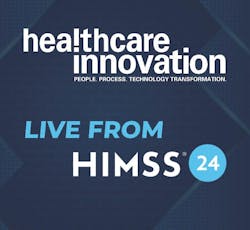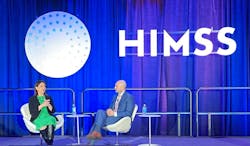The CDC—the federal Centers for Disease Control and Prevention—is working hard to help to move the entire U.S. healthcare system forward on syndromic data issues, Mandy Cohen, M.D., M.P.H., the CDC Director, told an audience on Tuesday, March 12, during HIMSS24, the annual conference of the Healthcare Information & Management Systems Society, being held this week at the Orange County Convention Center in Orlando. Dr. Cohen joined Steven Posnack, Deputy National Coordinator for Health IT, onstage, during a session entitled “Views from the Top: ONC & CDC Discuss the Nexus of Health IT and Public Health.”
Cohen, who had been Health Secretary of the North Carolina Department of Health and Human Services since January 2017, was appointed by President Joe Biden in June 2023 to serve as CDC Director, after a brief stint as CEO of Aledade Care Solutions between January 2022 and June 2023. She told the audience on Tuesday morning that “We are not building a public health infrastructure for data; we’re plugging it into the existing health IT infrastructure, purposely. We have a lot of work to do. We’ve learned a lot of lessons from the pandemic. The most immediate is our sharing information quickly, scientific Ing findings and data; translating science into practical, easy-to-understand policy. We’re prioritizing and modernizing public health communications, breaking down silos and promoting results-based partnerships. We’re modernizing data collection and analysis for action. That was the silver lining of the pandemic. It was really impressive. I don’t want us to all go back to our corners. Knitting together public health and our healthcare delivery system—I see them being knitted together through data collection and data-sharing.”
Cohen, who had been Health Secretary of the North Carolina Department of Health and Human Services since January 2017, was appointed by President Joe Biden in June 2023 to serve as CDC Director, after a brief stint as CEO of Aledade Care Solutions between January 2022 and June 2023. She told the audience on Tuesday morning that “We are not building a public health infrastructure for data; we’re plugging it into the existing health IT infrastructure, purposely. We have a lot of work to do. We’ve learned a lot of lessons from the pandemic. The most immediate is our sharing information quickly, scientific Ing findings and data; translating science into practical, easy-to-understand policy. We’re prioritizing and modernizing public health communications, breaking down silos and promoting results-based partnerships. We’re modernizing data collection and analysis for action. That was the silver lining of the pandemic. It was really impressive. I don’t want us to all go back to our corners. Knitting together public health and our healthcare delivery system—I see them being knitted together through data collection and data-sharing.”
And, Cohen said, “This is where the CDC’s public health data strategy comes in. We have to be able to rapidly detect public health threats. We have to be able to detect and monitor, disseminate, quickly. We have to make these investments. For me, this is about plugging in public health, not creating something new. Using the same data standards and a common path forward. It’s about TEFCA [the Trusted Exchange Framework and Common Agreement], standards, and FHIR [Fast Healthcare Interoperability Resources].”
Per that, Cohen said, “We’ve had some great accomplishments. As of January 2020, only 187 healthcare facilities were linked together through eCR [electronic case reporting]; as of March 2024, 32,700 healthcare facilities, March 2, 2024. That’s still only 25 percent. We now have an integrated lab data-sharing network nationwide,” she noted, adding that syndromic data coverage has been increased to encompass about 88 percent of ED (emergency department) visits, allowing for real-time threat monitoring.
Cohen referenced the following as key steps the agency has taken so far:
Ø Expansion of ECR (electronic case reporting) and syndromic automated feeds, across all diseases, not just measles, malaria individually, etc.
Ø Public health joins TEFCA
Ø Nationwide data standards available via EHRs (USCDI) and expand domain-specific data sets (USCDI+)
Ø Public health system technical standards
Ø Collaboration across federal government: HHS, ONC, CMS, CDC
With regard go ECR (electronic case reporting, Cohen reported that “We’re trying to move from 25 percent of facilities who can do real-time electronic reporting, to 75 percent. We want to increase coverage of syndromic surveillance to about 100 percent of ED visits. 2024: 95 percent of ED visit coverage. We’re moving forward on TEFCA; we want two public health use cases live by the end of the year, which is a lot of work. FHIR adoption for mortality and healthcare measures.”
And, she noted, “We’ve given out hundreds of millions of dollars to local public health agencies. We’re also supporting young families. Saying we’re all about the data doesn’t always translate, but saying that it translates into moms having healthy births, or preventing diabetes or heart disease—that, people can relate to. And improving the way in which we operate as an agency, as one team, rather than single-disease-oriented.”
And in that regard, Cohen added that “I think data is incredibly powerful. In North Carolina, we had 99 percent of our seniors vaccinated. And much higher rates of vaccination among our Black and Latino communities. And each and every day, we would look at the data and deploy teams based on that. You could not vaccinate for COVID unless you logged race and ethnicity, so we had 99-percent compliance. I love data standards, but we also have to think about the pipes and the people.”



